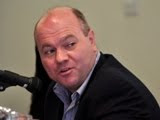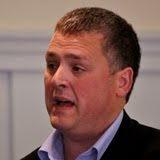Imagine waking up one morning to a knock on your front door. It's the police and they'd like to talk to you. Pretty soon you're sitting in a cell facing life imprisonment for a crime you know you didn't commit. The horror of knowing your friends and family, anyone you ever loved or met can see you've been convicted of a terrible crime. Your life has been taken away and the people you care about think you're a rapist or a murderer.
It's a nightmare and one that many people could be living right now. Worse, it could happen to any of us, anytime.
Our criminal justice system is fallible, we know that. When the Guilford Four, Birmingham Six and Maguire Seven were released there was such a public outcry that the government created an entirely new organisation - the Criminal Cases Review Commission - to make sure mistakes hadn't been made elsewhere too.
This news item from the CCRC's website tells a great story, a possible miscarriage has been investigated by the CCRC and referred to the court of appeal. Simon Hall will have the opportunity to present new evidence in his defence and a potential terrible miscarriage of justice might be rectified.
What it doesn't tell you is that the evidence that might prove his innocence would not have come to light if it were not for the hard work of the Bristol University Innocence Project. The CCRC could not have done this without them, and more worryingly, would not have.
So the CCRC was meant to be the solution to the problem. It was born out of the anger and fear that the high profile cases created. That anger and fear just isn't around now, miscarriages of justice aren't getting the same attention they once did. If the CCRC isn't up to the task, without the public outcry seen before how can we hope for the change we obviously still need to save innocent people?
When something happens once it's unique, startling and newsworthy. It happens again and we can't believe it, how could it possibly happen again? How could we let it? Then it happens again and again, it's a trend. The anger and amazement fades, it becomes commonplace and accepted.
We've begun to accept that this is just the way it is. The system will get it wrong and sometimes the wrong person will be imprisoned for a crime, sometimes the real criminals escape justice.
What we need is to make this a huge issue again. Raise awareness and stir things up. Let's all get radical.
Students! Remember the days when there were protest marches and riots? When students were revolutionary and it was about more than just getting a degree.
Journalists! What greater moral calling do we have than finding injustice and exposing it to the light of day?
All of us, everyone of us. We need to read about miscarriages of justice, we need to talk about miscarriages of justice. We need to be outraged every time the system gets it wrong. We need to shout about every mistake at the top of our voices, so next time they get it right.
Get angry. Make a big deal of it. It is a big deal.
Monday, 29 March 2010
Friday, 19 March 2010
Journalists should fight injustice
'We must revive the link between investigative journalism and miscarriages of justice' – Dr Eamonn O' Neill

We've been working on an innocence project for nearly six months now and I'm not exaggerating in the slightest when I say it's been one of the most exhilarating experiences of my life. Working on a case is addictive, I've spent untold hours pouring over witness statements and forensic evidence. Fire reports, crime scene photos, e-fits and psychological profiles. Slowly, a picture of events that took place over ten years ago is starting to come together. It's captivating.
I caught the bug at last October's INUK training event. The personal stories of miscarriages of justice we heard were infuriating and heartbreaking, the passion we saw in other members of the INUK was inspiring. Last week, myself and other students from the University of Winchester attended a similar event.
The chair and first speaker was Dr Eamonn O' Neill, a freelance investigative journalist and one hell of a role model for journalism students. He opened with a talk that made the journalists in the audience sit up that little bit straighter and swell with pride. The Innocence Network wants the skills we have to offer and thanks to the example set by Dr O' Neill, we want to give them.
He reminded us of the long tradition of journalists exposing the truth and freeing the wrongfully convicted, the late Ludovic Kennedy being a prime example. The BBC TV show Rough Justice, that resulted in 15 quashed convictions, was axed in 2007. According to Dr O' Neill this is just another symptom that there has been a decline of coverage in recent years, a dearth of journalists willing to put the time into investigating cases.
When Winchester first joined the INUK we were a little apprehensive about being the only university running cases without any law students. Now I choose not to see that weakness, instead I look at the strengths that journalists bring. Investigative journalists have incisive minds to spot what's important, they really want to get to the bottom of things. They have curiosity and persistence, a strong sense of purpose, a feeling of outrage about wrongdoing and a moral conviction to find the truth. They're prepared to be very unpopular and are determined enough to knock on the 16th door in the rain when they're tired and the first 15 doors have led them nowhere. They have courage and put tough questions to powerful people.
I think those are exactly the qualities needed to expose a miscarriage of justice.
'The system is process over truth, law before people' – Dr Michael Naughton

The founder of the INUK, Dr Michael Naughton then took the floor. He reminded us of the importance of factual innocence over legal innocence. As an innocence project we should be concerned with finding the truth, whether that means our client is innocent or guilty. We're not looking to free a prisoner on a legal technicality, rather find concrete evidence to prove that they either did or did not commit the crime they are imprisoned for. Circumstantial evidence is the enemy.
He argues that the current system is flawed and I'm inclined to agree with him.
'When there is no hope, there is always hope' - Mark Newby

Mark Newby was the keynote speaker at the conference. As a solicitor he's exposed injustice and freed the wrongfully convicted. He took the opportunity to take us through five of his cases and in the process showed how determination and an eye for detail can save lives.
He gave us a blow by blow account of how he and his team proved factual innocence. I took notes and Winchester's innocence project will be stronger for it.
It was a fantastic day and I came away with a host of ideas I can't wait to implement into our project. Growing up, many of the moral absolutes I held have been shattered by the reality of our society and justice system. It's my work with the Innocence Network UK that has convinced me some absolutes are worth clinging to. There is right and wrong, there is guilty and innocent. Sometimes it can be as simple as that.
(Photos courtesy of United Against Injustice)

We've been working on an innocence project for nearly six months now and I'm not exaggerating in the slightest when I say it's been one of the most exhilarating experiences of my life. Working on a case is addictive, I've spent untold hours pouring over witness statements and forensic evidence. Fire reports, crime scene photos, e-fits and psychological profiles. Slowly, a picture of events that took place over ten years ago is starting to come together. It's captivating.
I caught the bug at last October's INUK training event. The personal stories of miscarriages of justice we heard were infuriating and heartbreaking, the passion we saw in other members of the INUK was inspiring. Last week, myself and other students from the University of Winchester attended a similar event.
The chair and first speaker was Dr Eamonn O' Neill, a freelance investigative journalist and one hell of a role model for journalism students. He opened with a talk that made the journalists in the audience sit up that little bit straighter and swell with pride. The Innocence Network wants the skills we have to offer and thanks to the example set by Dr O' Neill, we want to give them.
He reminded us of the long tradition of journalists exposing the truth and freeing the wrongfully convicted, the late Ludovic Kennedy being a prime example. The BBC TV show Rough Justice, that resulted in 15 quashed convictions, was axed in 2007. According to Dr O' Neill this is just another symptom that there has been a decline of coverage in recent years, a dearth of journalists willing to put the time into investigating cases.
When Winchester first joined the INUK we were a little apprehensive about being the only university running cases without any law students. Now I choose not to see that weakness, instead I look at the strengths that journalists bring. Investigative journalists have incisive minds to spot what's important, they really want to get to the bottom of things. They have curiosity and persistence, a strong sense of purpose, a feeling of outrage about wrongdoing and a moral conviction to find the truth. They're prepared to be very unpopular and are determined enough to knock on the 16th door in the rain when they're tired and the first 15 doors have led them nowhere. They have courage and put tough questions to powerful people.
I think those are exactly the qualities needed to expose a miscarriage of justice.
'The system is process over truth, law before people' – Dr Michael Naughton

The founder of the INUK, Dr Michael Naughton then took the floor. He reminded us of the importance of factual innocence over legal innocence. As an innocence project we should be concerned with finding the truth, whether that means our client is innocent or guilty. We're not looking to free a prisoner on a legal technicality, rather find concrete evidence to prove that they either did or did not commit the crime they are imprisoned for. Circumstantial evidence is the enemy.
He argues that the current system is flawed and I'm inclined to agree with him.
'When there is no hope, there is always hope' - Mark Newby

Mark Newby was the keynote speaker at the conference. As a solicitor he's exposed injustice and freed the wrongfully convicted. He took the opportunity to take us through five of his cases and in the process showed how determination and an eye for detail can save lives.
He gave us a blow by blow account of how he and his team proved factual innocence. I took notes and Winchester's innocence project will be stronger for it.
It was a fantastic day and I came away with a host of ideas I can't wait to implement into our project. Growing up, many of the moral absolutes I held have been shattered by the reality of our society and justice system. It's my work with the Innocence Network UK that has convinced me some absolutes are worth clinging to. There is right and wrong, there is guilty and innocent. Sometimes it can be as simple as that.
(Photos courtesy of United Against Injustice)
Subscribe to:
Comments (Atom)